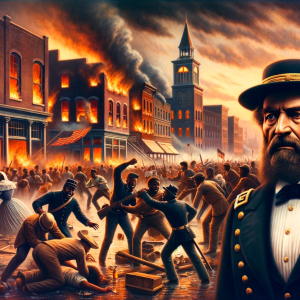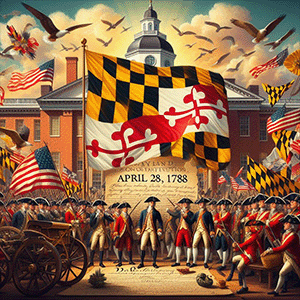The Siege of Charleston in 1780 was one of the most significant military confrontations of the American Revolutionary War. Charleston, South Carolina, held strategic importance due to its role as a major port city in the Southern colonies. By late 1779, British forces had shifted their focus to the Southern theater with the intention of... Continue Reading →
Admiral Lee
Admiral Willis Augustus Lee, born on May 11, 1888, in Natlee, Kentucky, left an indelible mark on naval history through his exceptional leadership, strategic acumen, and unparalleled expertise in naval warfare. From his early years to his heroic actions during World War II, Lee's legacy continues to inspire generations of sailors and naval strategists. Born... Continue Reading →
Queen of the Flattops
In the grand annals of United States naval history, few ships hold as storied a legacy as the USS Lexington CV-2. Initially conceived as a battlecruiser under the auspices of the ambitious naval expansion in the aftermath of World War I, her destiny was irrevocably altered by the Washington Naval Treaty of 1922. This treaty,... Continue Reading →
The Wilderness – Day 2
The Battle of the Wilderness, fought in the tangled thickets of Virginia, remains one of the most harrowing confrontations of the American Civil War. It marked the beginning of Ulysses S. Grant's Overland Campaign, an aggressive push toward the Confederate capital of Richmond, and pitted him against the formidable Robert E. Lee, whose Army of... Continue Reading →
Washington, D.C.
Washington, D.C., the capital city of the United States, was officially incorporated on May 3, 1802. This milestone in American history not only marked the formal establishment of its governance but also underscored the city’s central role in the national identity and administrative function of the country. The history of Washington, D.C., from its founding... Continue Reading →
The Memphis Race Riots
In the haunting aftermath of the Civil War, the city of Memphis, Tennessee, found itself ensnared in a brutal confrontation that would sear its name into the annals of post-war violence. The Memphis Massacre of May 1, 1866, an event marked by racial hostility and bloody reprisal, unfolded in a city pulsing with the tumult... Continue Reading →
On Untrodden Ground
Today, we embark on a journey back to the dawn of the American experiment. Our spotlight shines on the first presidential term of George Washington, a time when the nation’s destiny hung in the balance. On April 30, 1789, amidst the grandeur of Federal Hall in New York City, Washington stepped onto a second-floor balcony to take... Continue Reading →
The Camp Grant Masscre
On April 30, 1871, a harrowing event unfolded near the confluence of the San Pedro River and Aravaipa Creek in the Arizona Territory, known as the Camp Grant Massacre. This brutal incident involved the slaughter of nearly 150 Apache people, primarily women, children, and the elderly. The roots of this tragedy trace back to the... Continue Reading →
Maryland, My Maryland
In the heated debates surrounding the ratification of the U.S. Constitution, Maryland played a pivotal role as the seventh state to endorse the new framework of government on April 28, 1788. The state's decision was not made lightly; it reflected deep discussions and conflicts over federal power, representation, economic regulations, individual rights, and the contentious... Continue Reading →
BOOMER!
The Oklahoma Land Rush of 1889 marks a pivotal event in American Westward expansion history, involving the dramatic opening of the "Unassigned Lands" in the Indian Territory for settlement. These lands, centrally located, were deemed available after being considered surplus to the requirements of local Native American tribes under pressure from the U.S. Government. This... Continue Reading →
A Bright Sunny Wednesday
It was a very sunny, very beautiful day in Virginia Beach. Just after lunch, we were gathered into the the auditorium where the accident aboard USS Iowa was announced to us, and we were instructed as to what we could and could not say if we were approached by the media for comment. It went... Continue Reading →
Unforeseen Consequences
In the dark annals of American history, few events are as chilling and audacious as the conspiracy to assassinate President Abraham Lincoln. While John Wilkes Booth's successful assassination of Lincoln is well-documented, the simultaneous attempt on Secretary of State William H. Seward's life by Lewis Powell is a grim reminder of the extent of the... Continue Reading →
The Colfax Massacre
On April 13, 1873, an event occurred in Grant Parish, Louisiana, that would mark one of the darkest days in the history of post-Civil War America: the Colfax Massacre. This event did not happen in isolation; it was the culmination of intense political and racial tensions that had been brewing in the South. To understand... Continue Reading →
Inaugurating a Civil War
On April 12, 1861, the calm of Charleston Harbor was shattered by the echo of cannon fire, marking the onset of the bloodiest conflict in American history—the Civil War. The bombardment of Fort Sumter by Confederate forces from South Carolina was not merely an act of aggression but a culmination of growing tensions over states'... Continue Reading →
Direct Election
The 17th Amendment to the United States Constitution marks a pivotal shift in the method of electing senators, transitioning from legislative selection to direct election by the people. This amendment, ratified on April 8, 1913, fundamentally altered the landscape of American democracy. This article explores the background, catalysts, legislative journey, ratification process, initial impact, judicial... Continue Reading →
Ten-Go
On April 7, 1945, the Imperial Japanese Navy's pride, the battleship Yamato, met its tragic demise in the East China Sea. This monumental event occurred during Operation Ten-Go, a desperate mission that aimed to impact the Allied forces significantly but instead highlighted the shifting tides of naval power in the Pacific. The Yamato's sinking symbolized... Continue Reading →
Send the Word
On April 6, 1917, the United States Congress made a momentous decision that would forever alter the course of American history. By declaring war on Imperial Germany, the United States ended its stance of neutrality and joined the allies in World War I. This decision was not reached lightly and came after intense debate and... Continue Reading →
Steadfast Devotion
On April 5, 1951, during the tumultuous Korean Conflict, Navy Corpsman Richard De Wert made the ultimate sacrifice, showcasing extraordinary bravery and selflessness that would etch his name into the annals of American military history. His actions on that fateful day, in the face of overwhelming adversity, underscore the valor and commitment of those who... Continue Reading →
The President Is Dead
William Henry Harrison's ascent to the presidency was marked by a historic election in 1840, where he emerged victorious as the oldest president to be elected at the time. His campaign was the first to employ modern electoral tactics, including slogans, songs, and mass rallies, epitomized by the memorable "Tippecanoe and Tyler Too." Harrison, a... Continue Reading →
Operation Babylift
In the waning days of the Vietnam War, as North Vietnamese forces advanced towards Saigon, the United States embarked on a mission of mercy that would leave an indelible mark on the history of humanitarian efforts. Operation Babylift was conceived as a mass evacuation of orphans from South Vietnam to the United States and other... Continue Reading →



















